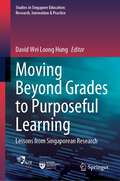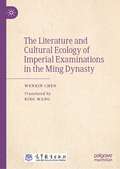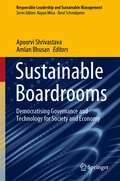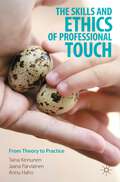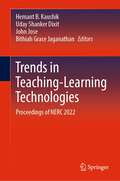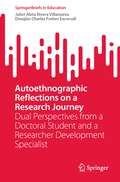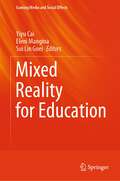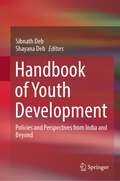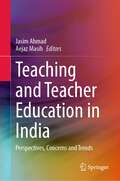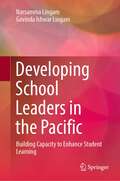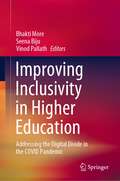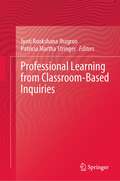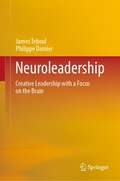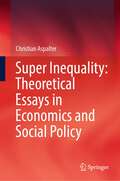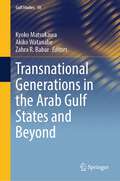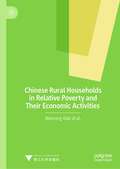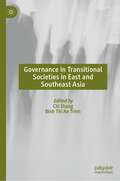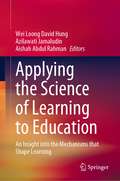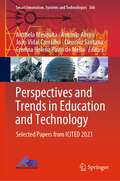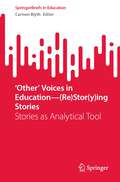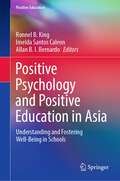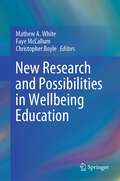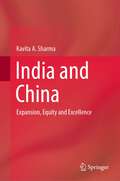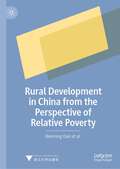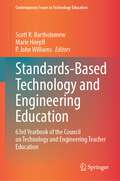- Table View
- List View
Moving Beyond Grades to Purposeful Learning: Lessons from Singaporean Research (Studies in Singapore Education: Research, Innovation & Practice #5)
by David Wei Loong HungThis book explores future directions in Singaporean education as it moves beyond its historically formative goals of survival, efficiency and performance, and its emphasis on grades and formal credentialing. It examines the future of education via the 4Life framework, a four-form model for purposeful learning centered around social-emotional regulation and the well-being of the individual learner: Life-long learning, the learning that occurs over a learner's lifespan; Life-deep learning, a deep understanding of learned content and adaptive expertise; Life-wide learning, learning in multiple contexts besides the school environment; and Life-wise learning, learning which focuses on the learner's values, morals, character and historical empathy. This book also illustrates how purposeful learning serves to equip learners with the knowledge, skills, dispositions and competencies they need to thrive as adaptive workers in the economy of the future.
The Literature and Cultural Ecology of Imperial Examinations in the Ming Dynasty
by Wenxin ChenThe book examines the relationship between imperial examinations and literature from the perspective of restoring the cultural ecology of imperial examinations in Ming China, breaking through the paradigm of pure literature research. This book presents an important practice in adjusting the pattern of literary research. The contents of this book include five mutually independent but supportive parts: 1) the living conditions and careers of the literary attendants; 2) the educational background and school’s consciousness of the Ming literati; 3) top candidates and Ming literature; 4) genres of imperial examination and the Ming society; 5) exam cheating cases from the perspective of politics and literature. This book will appeal to readers interested in Chinese literature and culture and the imperial examination system in ancient China.
Sustainable Boardrooms: Democratising Governance and Technology for Society and Economy (Responsible Leadership and Sustainable Management)
by Apoorvi Shrivastava Amlan BhusanThis book discusses various interactions in the sustainability and development sector. It presents a thematic approach to describe progressive models and cases on disruptions, innovations, regulatory and institutional evolution related to the area of sustainability, through an organizational and boardroom level governance lens. It documents how certain schools of thought, models of engagement and methods-platforms-practices impact society and while doing so, brings together varying theoretical debates, practicing models and instruments of transformation in green governance. Sustainable policy making demands a whole of government approach in decision-making processes. Further, inclusiveness and ‘green’ consciousness of corporate boardrooms are paramount, without which, effective socially responsible business practices are absurd. Human resource development, shaped on sustainable corporate ethics, requires well-trained sustainability specialists, managers that can think ‘green’ in their overall decision making which are essential for green governance. In this context, the book creates a functional, interpretive repertoire of stories, commentaries, life experiences, and reflections of corporate leaders, academics, and practicing consultants, on their decision-making processes, and how they interpret sustainability. These stories and thoughts help create a functional academic construct, which will assist academics teach ‘green’ competencies to business school students better, and entrepreneurs and business executives to better understand the idea of sustainable growth.
The Skills and Ethics of Professional Touch: From Theory to Practice
by Taina Kinnunen Jaana Parviainen Annu HahoThis book introduces readers to the ethical and goal-oriented functions of touch in professional practice. Touch is both an increasingly visible topic today and a core skill in many professions, especially in health, education and social work. This book combines helpful theoretical discussions and practical information, offering a balanced and culturally-informed introduction to an issue that both students and professionals often find difficult to navigate. Chapters discuss the various functions of touch and its uses, giving readers a deeper understanding of the potential of tactile work practices. The authors offer clear legal and ethical guidance to empower learners. They discuss key issues such as harmful touch and the increasing digitisation of patient work. Activities, case studies and further readings promote learning and help readers reflect on their own relationship to touch. This book will be an invaluable resource for students in undergraduate and graduate courses in healthcare, nursing, education and social work, and to practitioners looking for guidance on this topic.
Trends in Teaching-Learning Technologies: Proceedings of NERC 2022
by Hemant B. Kaushik Uday Shanker Dixit John Jose Bithiah Grace JaganathanThe book provides an insight into various facets of teaching and learning methodologies assisted by the technological advancements. The primary goal is to share with the readers about different experiences of technical as well as non-technical institutes in teaching and learning methodologies for improving the existing procedures. This volume will be of interest to those in academia and research.
Autoethnographic Reflections on a Research Journey: Dual Perspectives from a Doctoral Student and a Researcher Development Specialist (SpringerBriefs in Education)
by Juliet Aleta Villanueva Douglas Charles EacersallThis book assists research students, supervisors, practitioners, and associated others to successfully navigate their research journey by highlighting research student experiences leading to student success. It reveals the research journey through an auto-ethnographic study based on the research student’s narratives accompanied by digital artifacts. It also includes commentary from the perspective of a researcher development specialist who assisted this researcher throughout this journey. This book provides insights into research journeys through layered accounts and meanings, which include the first author’s life events spanning almost two decades alongside higher education pursuits. It presents the perspective of a K-12 teacher-researcher moving into higher education in her local university, who is a Southeast Asian female international student embarking on her second-chance degree in a predominantly Australian learning environment/culture. Accompanying this is the perspective of a research training and development professional who has also undertaken higher degree by research studies.
Mixed Reality for Education (Gaming Media and Social Effects)
by Yiyu Cai Eleni Mangina Sui Lin GoeiThis book consists of chapters that present the state-of-the-art research on mixed reality, simulation and serious games with applications in four main educational topics: (1) K-12 STEAM Education; (2) Tertiary/Professional Education; (3) Special Needs Education; and (4) Cultural, Social & Museum Education. The chapters of the book present a multi-facet view on different approaches to deal with challenges that surround the uptake of educational applications of mixed reality, simulations and serious games in various practices. The different approaches highlight challenges and potential solutions and provide future directions for mixed reality, simulation and serious games research, for the design of learning material and for implementation. By doing so, the book is a useful resource for both students and scholars interested in research in this field, for designers of learning material and for practitioners that want to embrace mixed reality, simulation and/or serious games in their education.Chapter "Development of AR Interactive Components for Positive Behavioral Interventions and Supports" is available open access under a Creative Commons Attribution 4.0 International License via link.springer.com.
Handbook of Youth Development: Policies and Perspectives from India and Beyond
by Sibnath Deb Shayana DebThis handbook provides a comprehensive overview of youth development, including theories and applications across different countries, namely India, the UK, and Australia. It presents the status of youth and their role in society, their education, and their career perspectives. The focus is on developing youth's internal abilities by providing a creative and supportive environment through appropriate mentorship and encouragement. It discusses a wide range of contemporary and relevant issues relating to holistic career growth of youth, whereby youth work is recognized as a profession. Academicians from various disciplinary backgrounds offer conceptual and methodological perspectives. Chapters into five themes focus on a balance between developing stable, protective factors for mental health, and positive youth development to ensure appropriate cognitive, social, emotional, and behavioral skills needed to thrive in an evolving world. It discusses the status of the youth in terms of digital competency, engagement of youth in sports, teaching, political process, and community development activities in the present and rapidly altering world scenario. The book also discusses the role of institution-based family counseling for healthy youth development. Given its comprehensive coverage, the handbook is an essential resource for a broad audience of youth researchers, practitioners and policymakers of population sciences, childhood and youth studies, development studies, and psychology.
Teaching and Teacher Education in India: Perspectives, Concerns and Trends
by Jasim Ahmad Aejaz MasihThis book provides a focused and comprehensive overview of gradual development and reforms in teacher education in India. It discusses historical development, policy perspectives, quality concerns, current practices, and trends of teacher education in India. It highlights the prevailing social image of teachers and the teaching profession, as well as the emerging problems and issues faced in teacher development programs, indicating the need to focus upon the transformative changes. Each chapter provides an in-depth research-based analysis and reflects on a specific theme: education policies and commissions, curricular reforms, ICT integration, and the digital revolution. It offers alternative practices by drawing a comparison with developed nations. It is an indispensable resource for teacher educators, school administrators, curriculum designers, policymakers, and researchers in teacher education.
Developing School Leaders in the Pacific: Building Capacity to Enhance Student Learning
by Narsamma Lingam Govinda Ishwar LingamThis book provides detailed insights on the training and development for Pacific Island school leaders. It draws extensively on original empirical research that explores school leaders’ perceptions of how leadership and management training impacted their professional practices, and how these practices in turn impacted the dynamics of school operations. This book addresses a critical need to understand how to support leadership development for all Pacific schools, but especially in schools that are faced with the increasing challenges of learning and teaching conditions. In small island developing states in the Pacific region, school leaders face a myriad of challenges due to limited human and material resources, and a fragile economic base. Written by Pacific Islander authors, this book provides insights from different countries in the Pacific Islands. It shows how contextual challenges can exert enormous pressure on school leaders who are leading and managing schools without any leadership preparation.Given the importance of effective leadership practices and its impact on student learning outcomes, this book aims to be a source of reference for practitioners and educational authorities who have a vested interest in the provision of quality education in the Pacific region and beyond.
Improving Inclusivity in Higher Education: Addressing the Digital Divide in the COVID Pandemic
by Bhakti More Seena Biju Vinod PallathThis book addresses issues of access that COVID-19 brought forth in higher education, with a primary focus on Asian countries. In looking to address SDG4 to promote “inclusive and equitable quality education for all”, the volume explores the challenges relating to educational exclusion by considering how specially-abled students have been impacted by the digital divide in the context of the pandemic. It puts a spotlight on the approaches, experiences, and case analyses from various geographies in the region to study transitions in inclusivity. Universities and institutes of higher education have had to reconsider their digital offerings and services all the more since the onset of the pandemic, but have, in many instances, failed to fully account for how Internet access can be limited, unavailable, or unaffordable for many students. As a result, specially-abled learners – students without sufficient technological resources, such as those living in remote areas where there are little or no Internet facilities – have been, however unintentionally, neglected. While universities implemented their own practices, processes and policies to reach, and teach, disadvantaged learners, they had to further adapt these strategies, re-aligning them to meet the unprecedented circumstances, and concomitant needs, of specially-abled learners – and there is still much more to do. This book consolidates regional perspectives on how to work towards goals of inclusivity, and bridge the digital divide, looking into, and beyond, the conditions of the pandemic. Relevant to scholars and policymakers, this book is of interest to those focused on digitisation and the transition to the ‘new normal’ in higher education.
Professional Learning from Classroom-Based Inquiries
by Jyoti Rookshana Jhagroo Patricia Martha StringerThis book provides authentic practice-based inquiries by pre-service teachers. Their reflective narratives showcase their individual inquiries as they navigated their self-chosen professional learning journeys through the teaching as inquiry framework. The narratives advance what it means to be a reflective practitioner in practice and highlight necessary dispositional skill sets to attain valuable professional learning through inquiry. Through an inquiry stance, pre-service teachers are liberated from being knowledge consumers to local knowledge producers relevant to their practice. The dissonance this shift creates, negates the ‘comfortable doing’ of teaching to make the act of teaching authentic, relevant, and powerful.
Neuroleadership: Creative Leadership with a Focus on the Brain
by James Teboul Philippe DamierThis book illustrates, through a number of examples from different domains, how to put in place a disciplined process to develop a creative leadership approach. Today's managers seem to have all the tools at their disposal, leadership training, seminars and executive coaching, to exercise effective leadership, but most continue to take the easy path of raw authority, neglecting the interwoven texture of leadership and followership. The classic models of leadership fail routinely because leaders find it hard to develop an effective way of motivating their followers and do not realize how far they are conditioned by the limitations and biases hardwired in their brains. Just like sports professionals who need a good understanding of their body, leaders need to practice and explore the capabilities of their brains. With some knowledge in the latest discoveries in Neurosciences and mastery of their cognitive predispositions, leaders can draw on a range of resources to engage all parties in learning and collaborating towards common goals and create a culture based on cooperation and innovation. Ideal for organizations or associations, private or public companies, this book offers practical advice on neuroleadership through examples of successful transformation including a case study at Netflix.
Super Inequality: Theoretical Essays in Economics and Social Policy
by Christian AspalterThis book bridges the disciplines of micro-economics and social policy in general, and, in particular, behavioral/explanatory social policy and public choice theory, plus Leibenstein’s X-efficiency theory. Being trained as an economist and social policy scientist, the author leaps out of the comfort zone of most social policy scientists and experts, right into the exciting world of micro-economic theory, and then extending and connecting those theories to explain major social, political and economic conundrums of our time. In doing so, the book offers a new set of theoretical—and practical—explanations derived from the general proposition of micro-economic theory, of how government officers, policymakers, administrators and the people themselves alike are, by and large, motivated in their daily as well as strategic (long-term) decision-making. Using a meta-analytical approach (based on a number of grand theories), this book also explains systemic factors behind human behavior and the thereof resulting shortcomings in lifetime outcomes (health, wealth and happiness of a person) and at the same time societal, policy-making, and economic outcomes on societal level, and in global comparison.The outcomes thereof can be measured exactly (and hence validated), especially through the method of empirical comparative social science/economic research. Here, the author also (but not only) introduces the new method of using Aspalter's Standardized Relative Performance (SRP) Index in measuring exactly complex, aggregate performances of multiple governments, and that at the same time also across the entire world.
Transnational Generations in the Arab Gulf States and Beyond (Gulf Studies #10)
by Kyoko Matsukawa Akiko Watanabe Zahra R. BabarThis book examines the recent migration phenomenon in the Arab Gulf states for work and residence. It sheds light on the transnationality of diverse groups of migrants from different generations, and unpacks how migrants’ multiple senses of belonging, orientations and adaptive strategies have shaped contemporary migration in the Gulf region. In turn, the analysis presented here shows how the Arab Gulf states’ citizenship and educational policies affect second-generation migrants in particular. Through a series of fine-grained ethnographic case studies, the authors demonstrate the ways in which these second-generation migrants construct their identities in relation to their putative ‘home’ country in the Gulf as well as their complex relationship to their parents’ countries of origin. This is what underpins the deeply transnational character of their lives, choices and notions of belonging. While migration scholars often situate these groups as ‘temporary’, this does not in fact capture the reality of temporariness for the migrants themselves, their children or their dependants. The result is a complex and ongoing construction of identity that shapes the way of life for millions of migrants. Relevant to scholars of migration and international studies, particularly focused on the Middle East, Transnational Generations in the Arab Gulf States and Beyond is also of interest to social scientists researching student mobility in higher education, intergenerational families, identity politics and globalisation.
Chinese Rural Households in Relative Poverty and Their Economic Activities
by Wenrong QianThis book summarizes the new economic phenomenon and problems of rural families in China from the perspective of relative poverty. Based on the data of China Rural Household Panel Survey (CRHPS), a nationwide on-site survey conducted door to door by Zhejiang University, this book focuses on the theme of relative poverty and provides a systematic analysis of the economic activities of rural households in three main aspects: agricultural production and management, land utility and transfer, and migration of rural households and citizenization of migrant workers. Besides, this book also explores focuses on the performance of relatively poor households in terms of agricultural production, land transfer, non-farm employment and social security, and provides a basic mapping of the situation of relatively poor households in rural China, so as to provide a scientific basis for improving the living standards of rural households, establishing a long-term mechanism for poverty alleviation. CRHPS not only includes individual-level and household-level data, but also corresponding community-level data, which makes it possible to conduct a comprehensive study of the rural households. Researchers of Chinese rural problems and government officials (especially the department of agriculture officials) will find this book especially interesting.
Governance in Transitional Societies in East and Southeast Asia
by Chi Zhang Binh Thi An TrinhThis book brings together scholars based in, or had previously been based in a range of East and Southeast Asian countries, building on their respective primary empirical data and first-hand experience as academics and think tank researchers, in order to pluralise the current debates about governance in transitional societies. In an era of global democratic backsliding, this edited volume offers less-explored local perspectives, to balance the Western-centrism observed in area studies and the focus on former Soviet countries in transit. What is the future of governance in Asia? This book, by attempting to supply a diversity of answers, will interest political scientists, economists, and journalists.
Applying the Science of Learning to Education: An Insight into the Mechanisms that Shape Learning
by Wei Loong David Hung Azilawati Jamaludin Aishah Abdul RahmanThis book provides an overview of the various 'Science of Learning' (SoL) research projects led by researchers at the National Institute of Education, Nanyang Technological University, Singapore, and international research collaborators. It presents the goals and rationale behind the Science of Learning in Education (SoLE) initiative and examines a spectrum of topics relevant to bolstering our understanding of the science underlying learning. The Science of Learning (SoL) is an advancing field, with proponents extolling its potential impact on educational practice. This book investigates the possible correlations or causal relationships between brain functioning and development, physiology, environment factors, and their impact on learning. It promotes an interdisciplinary approach to understanding biological to behavioural mechanisms of learning that are oriented toward optimizing and maximizing every learner’s potential.
Perspectives and Trends in Education and Technology: Selected Papers from ICITED 2023 (Smart Innovation, Systems and Technologies #366)
by Anabela Mesquita António Abreu João Vidal Carvalho Cleuciliz Santana Cristina Helena Pinto de MelloThis book presents high-quality, peer-reviewed papers from the International Conference in Information Technology & Education (ICITED 2023), to be held at the Nilton Lins University, Manaus, Brazil, during June 29–30, 2023. The book covers a specific field of knowledge. This intends to cover not only two fields of knowledge—Education and Technology—but also the interaction among them and the impact/result in the job market and organizations. It covers the research and pedagogic component of Education and Information Technologies but also the connection with Society, addressing the three pillars of higher education. The book addresses impact of pandemic on education and use of technology in education. Finally, it also encourages companies to present their professional cases which will be discussed. These can constitute real examples of how companies are overcoming their challenges with the uncertainty of the market.
‘Other’ Voices in Education—: Stories as Analytical Tool (SpringerBriefs in Education)
by Carmen BlythThis book explores how stories can be used as ‘data’ that prefigure and make possible the numerous permutations of life that comprise existence, and examines how stories can be reconfigured to transform that existence into something 'other'. It uses varied theoretical and critical frameworks such as autoethnography and posthumanism with which to explore the stories shared that go ‘beyond cause and effect’. This book looks to engage with storying and storytelling as inquiry in non-Western ‘worlds’, and looks to make ‘storying’, ‘restor(y)ing’, and ‘stories’ written by non-Western educators the locus of attention. By doing so, it seeks to illustrate what distinctive ways of storying and storytelling can look like in worlds other than those that follow a Western ethico-onto-epistemological worldview. It provides a way to articulate thought that may be commonly omitted in teacher education around the world, and looks at ‘truth’ as situated rather than as totality, local rather than global, with stories used to problematize subject/object positionings within those same stories.
Positive Psychology and Positive Education in Asia: Understanding and Fostering Well-Being in Schools (Positive Education)
by Ronnel B. King Imelda Santos Caleon Allan B. I. BernardoThis book explores students’ and teachers’ well-being from positive psychology and education perspectives and showcases interventions that optimize well-being in the school context. The book also covers crucial positive psychology and education topics/themes including character strengths, gratitude, growth mindset, grit, resilience, positive emotions, and well-being among others. The chapters include reviews and empirical research based on diverse methodologies, such as correlational, experimental, quasi-experimental, intervention, longitudinal, and qualitative approaches from six different Asian sociocultural contexts—Singapore, Hong Kong, Mainland China, Israel, Macau, and Philippines. All the chapters, provide practical pointers for teachers and educators who aim to nurture well-being in schools.
New Research and Possibilities in Wellbeing Education
by Mathew A. White Faye McCallum Christopher BoyleThis book examines a variety of issues related to wellbeing education and cross-cultural education, curriculum and pedagogy, education policy and systems, teacher education and professional development of educators, educational administration, management and leadership, and inclusive education. Stimulated, in part, by the launch of positive psychology, wellbeing education has grown worldwide. Various theories of wellbeing have been adopted in education, coining the term 'wellbeing education', defined in this book as how school leaders and teachers plan to implement evidence-informed wellbeing interventions to promote wellbeing and academic goals. This book investigates a series of questions related to wellbeing education, and how evidence-informed wellbeing approaches are integrated into learning, teaching, and education.
India and China: Expansion, Equity and Excellence
by Kavita A. SharmaThis book provides a comprehensive overview of higher education in India and China and the complexity of issues involved. It focuses on gaining understanding of education systems, governance mechanisms, globalisation and emergence of the private sector, action policies of both the countries and their impact on education and society. Offering a comparative perspective, the book discusses why China is ahead of India in Higher Education when both share the similar challenges of burgeoning young population and scarcity of resources. It examines the success in providing equitable access to both country’s marginalised sections. It also discusses the directions of future growth through National Education Policy, 2020 and the 13th Five Year Plan of the Chinese State Council. Combining rich content and a broad scope, the book offers a valuable key to understanding Higher Education system of India and China. It is a useful read for students and researchers in social sciences, education area.
Rural Development in China from the Perspective of Relative Poverty
by Wenrong QianThis book provides a broad survey of Chinese rural households at a time of rapid change in China’s rural economy, examining the dual identity of households as consumers as well as producers of goods in terms of supply and demand. Based on the results of the China Rural Household Panel Survey (CRHPS) by Zhejiang University, this book analyzes four types of economic activities of rural households in China, particularly considering changes at the micro level. It examines how households strive to maximize family efficacy through input-output production decision-making in allocating limited resources. Examining data pertaining to agricultural production, land exploitation, migration and nationalization, as well as changes in economic behavior, this book offers a snapshot of the current situation of rural households in China and suggestions to improve living standards and related policies.
Standards-Based Technology and Engineering Education: 63rd Yearbook of the Council on Technology and Engineering Teacher Education (Contemporary Issues in Technology Education)
by Scott R. Bartholomew Marie Hoepfl P. John WilliamsThis book brings together authors from around the world to discuss the Standards for Technological and Engineering Literacy: The Role of Technology and Engineering in STEM Education (STEL) released in July 2020 by the International Technology and Engineering Educators Association (ITEEA). The various chapters examine and elaborate on how educators must understand the structure of the standards used and their alignment with educational programs at specific levels and contexts, both in the context of the USA, and internationally. It also showcases case studies analyzing the use of standards in their various contexts from a number of countries which have either adapted STEL, or which have national Standards in Technology Education. The STEL represents a major update to the content standards that has guided the field of technology education (and, later, technology and engineering education) in the USA since 2000. In contrast to previous standards, STEL presents a substantial reduction in the number of standards and associated benchmarks, and the benchmarks have been operationalized to identify the key knowledge, skills, and dispositions associated with each standard. It also emphasizes a focus on core standards that should allow for deeper levels of understanding and engagement on the part of students, who in comprehensive educational programs will continue to revisit these core standards in increasingly sophisticated ways as they progress from Pre-K through Grade 12.
